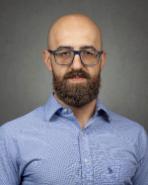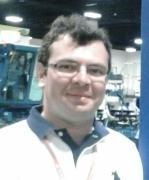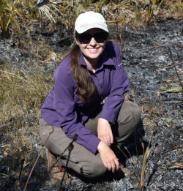Dr. Maria Silveira Current Students
Leandro Otavio Vieira-Filho, PhD Candidate
 Leandro is originally from São José dos Ausentes, Brazil. He grew up in a 6th generation family ranch in the mountain region of Rio Grande do Sul state. He earned his BS degree in Agronomy from the Federal Institute of Education, Science and Technology of Santa Catarina. During his BS degree, he had the opportunity to study abroad at Oregon State University (USA) where he was involved in water stress and plant nutrition research of white cabbage and hybrid onion under the supervision of Dr Matthew D. Madsen. He also worked with Dr Fernando J. Garbuio and Dr Fabiana Schmidt on soil fertility research of rice paddy fields. A few months after the graduation, he started his Master’s degree at the University of São Paulo (College of Agriculture “Luiz de Queiroz”), under the guidance of Dr Francisco A. Monteiro. His MS project was focused on investigating the potential of tanzania guinea grass as a phytoremediator of copper under different Si management strategies.
Leandro is originally from São José dos Ausentes, Brazil. He grew up in a 6th generation family ranch in the mountain region of Rio Grande do Sul state. He earned his BS degree in Agronomy from the Federal Institute of Education, Science and Technology of Santa Catarina. During his BS degree, he had the opportunity to study abroad at Oregon State University (USA) where he was involved in water stress and plant nutrition research of white cabbage and hybrid onion under the supervision of Dr Matthew D. Madsen. He also worked with Dr Fernando J. Garbuio and Dr Fabiana Schmidt on soil fertility research of rice paddy fields. A few months after the graduation, he started his Master’s degree at the University of São Paulo (College of Agriculture “Luiz de Queiroz”), under the guidance of Dr Francisco A. Monteiro. His MS project was focused on investigating the potential of tanzania guinea grass as a phytoremediator of copper under different Si management strategies.
After completing his MS, Leandro returned to his family ranch for one year to work with agricultural production. In 2018, he contacted Dr Maria L. Silveira and took time to prepare for the PhD admission process. In the summer of 2019, Leandro began his PhD with the Soil and Water Science Department at University of Florida under the guidance of Dr Silveira. His doctoral research is focused on soil P dynamics and the agronomic impacts of biosolids applications to grazing land ecosystems.
EXCHANGE VISITORS
Dr. Abmael da Silva Cardoso, Exchange Visitor (Research Scholar)
 I was born in Ceres, Brazil, a small town named in honor of the Roman goddess of agriculture. As far as I know, all my ancestors have dedicated their lives to crop and livestock production. When I was a child, I wore my checkered hat and helped my grandfather to manage our family’s cow herd. Because farming is in my blood, I decided to pursue a high school diploma in agriculture, follow by a bachelor’s degree in agricultural sciences, master in soil science, and PhD in animal science.
I was born in Ceres, Brazil, a small town named in honor of the Roman goddess of agriculture. As far as I know, all my ancestors have dedicated their lives to crop and livestock production. When I was a child, I wore my checkered hat and helped my grandfather to manage our family’s cow herd. Because farming is in my blood, I decided to pursue a high school diploma in agriculture, follow by a bachelor’s degree in agricultural sciences, master in soil science, and PhD in animal science.
My passion for scientific discovery began when I was 14 years old and never stopped since then. In high school, I participated in experiments designed to evaluate the allelopathic effect of African Bermuda grass (Cynodon nlumfuensis) on weeds and N fertilization on wheat production. During my high school, I also attended my first scientific conference.
During my undergraduate program at Federal Rural University of Rio de Janeiro, I studied nitrous oxide emissions from animal excreta. During my master, I conducted a life cycle analysis assessing the environmental impacts of the 5 main Brazilians beef cattle production systems. During my PhD in Animal Science at São Paulo State University, I evaluated strategies to mitigate greenhouse gas emissions from grazing systems. During this period, I also had the opportunity to work for 1 year as a Visiting Scholar in the Federal Institute of Technology of Zurich, Switzerland where I learned stable isotope techniques (such as 15N) to identify N2O pathways.
After completing my PhD degree, I worked as a Postdoctoral Associate in the Department of Animal Sciences in the São Paulo State University. During this period, I had the opportunity to broaden my scientific skills. My research interests included animal production in grassland, grassland management, and assessing greenhouse gas emissions from dairy and beef cattle production.
In 2019, I met Dr. Silveira during the short course offered to the Unesp Forage Research group in Jaboticabal. In Sept. 2021, I joined her program at the UF/IFAS Range Cattle REC in Ona as an exchange visitor, research scholar for a three year program. I am thrilled to be part of the USDA, Long-Term Agroecosystem Research (LTAR) network mainly because of the multidisciplinary nature of this project and the complex production and ecological challenges it addresses. To me, this is a great opportunity to work collaboratively on science-based solutions that can help advance sustainable intensification of agriculture in the U.S. and globally.
Dr. Marta Moura Kohmann, Exchange Visitor (Postdoctoral Associate)

In August 2011, Marta moved to Gainesville, FL to pursuit her master’s degree in Agricultural Engineering at the University of Florida. Her program focused on quantifying greenhouse gas emissions from beef production systems in Florida through both modeling and field experiments. During her time as a master’s degree student, she was a part of the AgroClimate Group led by Dr. Clyde W. Fraisse (main advisor). This group has the goal of providing producers with climate information via interactive tools to assist in management decisions, and provided her with many opportunities to meet with farmers and stakeholders. During that time, Marta also assisted in organizing the Agro-Systems Seminars, a seminar series that hosted visiting researchers presenting novel work to faculty, staff, and students in the University of Florida.
In May 2014, Marta initiated her Ph.D. degree in Forage Management in University of Florida’s Agronomy Department under the guidance of Dr. Lynn E. Sollenberger. The overarching goal of her doctorate program was to quantity ecosystem services provided by inclusion of legumes in grass pastures. During her program, Marta studied nutrient cycling in legume-grass mixed swards compared to grass-only pastures managed with typical N fertilization rates. She also investigated greenhouse gas emissions from excreta of animals fed legume-grass pastures compared to N-fertilized grass monocultures. While a Ph.D. student, Marta had the opportunity to serve as a Teaching Assistant in Forage Science and Range Management (3 semesters) and Experimental Statistics for Plant Science (two semesters), an activity she truly enjoys. Additionally, Marta served the Agronomy Graduate Student Association as treasurer and as vice-president, helping organize events to integrate faculty and students in the department.
Currently, Marta is a Postdoctoral Associate under Dr. Maria Silveira working on the LTAR (Long-Term Agroecosystem Research) project. The LTAR project is part of a nation-wide network sponsored by the USDA with the objective of increasing sustainability in different agricultural production systems. In Florida, the research is developed with a partnership between the Range Cattle REC and Archbold Biological Center and evaluates the effect of fire frequency and associated mechanical control of native rangeland on greenhouse gas emissions, nutrient cycling, soil chemical characteristics, vegetation biomass and composition, and many other parameters of agronomic and environmental relevance. This research is of particular interest due to the importance of native rangelands in South Florida, a unique ecosystem hosting multiple plant and animal species and threatened by increasing urbanization. Results from this project with help define management practices that reduce risks and increase sustainability of native rangelands.
